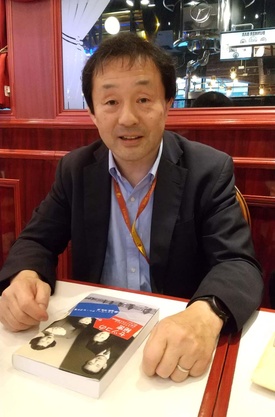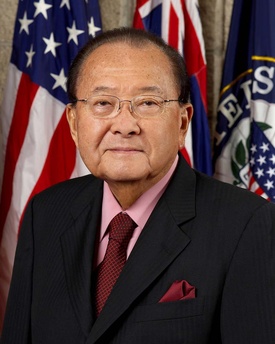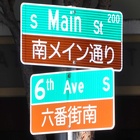The recently published Japanese translation of "Setsuko's Secret: Heart Mountain and the Legacy of Japanese American Internment" (Shirley Ann Higuchi, Ecom Press) is a powerful work in which the third-generation Japanese-American author vividly describes her own family history while tracing the issue of the internment of Japanese-Americans during the war.
The translator is Nakahiro Iwata, a reporter for the Tokyo Shimbun newspaper and a visiting researcher at Josai International University. We spoke to Iwata about how he came to translate the original "Setsuko's Secret: Heart Mountain and the Legacy of the Japanese American Incarceration" (University of Wisconsin Press, 2020) and the appeal of the book.
Meeting Daniel Inouye
What prompted you to translate this book?
Iwata: In May 2019, I was posted to Washington as a correspondent. This was my second time there. As I will explain later, during my previous posting (2008-2011), I met Senator Daniel Inouye (deceased), and ever since then, I have wanted to delve deeper into the history of Japanese Americans if I were to be posted there again.
Soon after I arrived, I was invited by Noriko Saneto, a Japanese American researcher at the Smithsonian National Museum of American History, to cover a "pilgrimage" to the site of the former Heart Mountain internment camp in Wyoming in July, and she introduced me to Shirley Ann Higuchi, president of the Heart Mountain Foundation and author of the book. The pilgrimage is an event where survivors of internment and their families gather to pledge to never let the unfortunate history of the past be repeated. I also interviewed Shirley on-site. It was through this connection that I was asked to translate the book.
During the pilgrimage, I had the opportunity to interview many people who experienced the internment camps, including former Secretary of Transportation Norman Mineta, who passed away last year, but the original book described the dramatic lives of each of them, which could never have been uncovered in a short interview. I gladly raised my hand because I wanted to translate this non-fiction book that gives a broad overview of the history of Japanese immigration through Shirley's family and people with ties to Heart Mountain.
--The original book is 336 pages long, so it must have taken a long time to translate. I imagine you did it in between your regular work schedules, but how many hours (days) did it take?
Iwata: I returned to Japan in May 2021 and started the project in July, so it took almost two years. After returning to Japan, I was assigned to the digital news distribution department, and because the working hours were long, I focused on the project on my days off.
INTERVIEWER How did your involvement with Japanese Americans and events surrounding Japanese Americans begin?
Iwata: My first visit to Washington was when I met Senator Daniel Inouye, and that's what sparked my interest in Japanese Americans. After the Obama administration came to power in 2009, the Japanese government turned to this Congressional heavyweight, who had been a senator for nearly 50 years, as a strong liaison with the U.S. government, and through my reporting I saw firsthand how much respect the veteran senator was held.
For example, Hillary Clinton, who had just become Secretary of State at the time, chose Japan as her first overseas destination. The Japanese government asked Clinton to meet with the families of victims abducted by North Korea, but her schedule was so packed that it was difficult to arrange it. When Inouye learned of this, he visited Clinton at the State Department and directly conveyed the Japanese government's intentions. For Clinton, who served as a senator for eight years before becoming Secretary of State, Inouye was her senior, having been in office for nearly 50 years. "If that's what you say," he said, and it was decided that she would meet with the families on the spot. This is an anecdote I heard from a senior official at the Ministry of Foreign Affairs at the time.
In the same year, in order to strengthen ties with Japan, Mr. Inouye's wife, Irene Hirano Inouye, established the U.S.-Japan Council, which is made up of Japanese-American intellectuals. I was surprised when then-Vice President Biden, who was now President of Japan, came to celebrate the inaugural meeting. I still remember watching with my mouth agape as Biden gave his congratulatory speech, jokingly saying, "Danny and I have known each other for a long time..."
I had the opportunity to interview Inouye in person in January 2010. He invited a group of Japanese reporters to the Senate Appropriations Committee Chairman's office to hold a press conference on the then contentious issue of relocating the U.S. military's Futenma Air Base (Ginowan City, Okinawa Prefecture). When I extended my right hand to greet him and shake his hand, he shook it with his left hand, which took me aback. To my embarrassment, it was then that I learned for the first time that he had lost his right arm on the European front as a member of the 442nd Regimental Combat Team, a Japanese-American unit.
Although he was an American citizen, he was labeled an enemy alien after the Japanese military's surprise attack on Pearl Harbor, and was even abandoned by the Constitution due to racial discrimination. However, he risked his life to fight for his country and continue to serve, and furthermore, he strives to build a bridge between Japan and the United States, in order to prove his American citizenship. At the time, I didn't have the time to dig deeper, but if I had a second chance, I would definitely like to interview him. Unfortunately, Mr. Inouye has passed away, but my desire to dig deeper into the history of Japanese Americans has grown.
© 2023 Ryusuke Kawai








